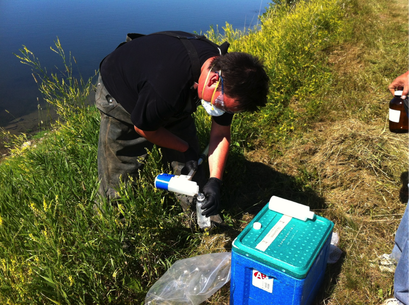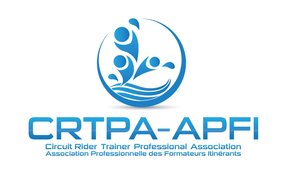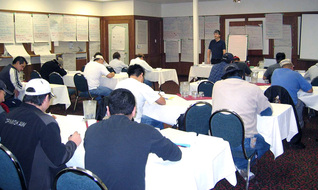
CRTPA is the professional association for Canadian Circuit Rider Trainers.
The Circuit Rider Training Program (CRTP) provides quality one-on-one training to First Nations operators, supporting them in the operation and maintenance of drinking water and wastewater systems in First Nations communities.
Under this program, Circuit Rider Trainers (CRTs) visit First Nation communities to work with water operators, providing as much time and hands-on support as is required to ensure the reliable provision of safe drinking water.
The CRTP program is tailored to the needs and aptitudes of each trainee. Operators learn how to operate, service, and maintain the water and wastewater systems in their community.
The Circuit Rider Training Program (CRTP) provides quality one-on-one training to First Nations operators, supporting them in the operation and maintenance of drinking water and wastewater systems in First Nations communities.
Under this program, Circuit Rider Trainers (CRTs) visit First Nation communities to work with water operators, providing as much time and hands-on support as is required to ensure the reliable provision of safe drinking water.
The CRTP program is tailored to the needs and aptitudes of each trainee. Operators learn how to operate, service, and maintain the water and wastewater systems in their community.
How does the program work?
Circuit Rider Training Program is competency based. The instructor visits the community on a scheduled basis teaching about the specific equipment that is installed in the community plant and working with the operators on their equipment.
The program helps ensure that potable water is provided to community members, that the plants and buildings are operating efficiently and effectively and that the maintenance is being performed properly to ensure that the maximum life span of the buildings and equipment is realized.
The program helps ensure that potable water is provided to community members, that the plants and buildings are operating efficiently and effectively and that the maintenance is being performed properly to ensure that the maximum life span of the buildings and equipment is realized.
Early Circuit Rider Training Program
The Circuit Rider Training Program (CRTP) as it is presently structured was modeled after a highly successful training program carried out in Saskatchewan by the Saskatchewan Water Corporation in the 80’s.
In 1992 it was determined that a program of instruction would be required to provide training in plant operation in the new water and wastewater treatment plants that were being constructed in First Nations Communities across Canada.
A committee was struck and they investigated various ways to provide essential training. The Saskatchewan Water Corporation model and the Alaskan Circuit Rider training systems model were studied and it was determined that the Saskatchewan Circuit Rider program would the best model for the First Nation needs in Canada.
In the spring of 1994 the program was started in Ontario as a two-year pilot project under the sponsorship of Health Canada and facilitated by the Assembly of First Nations in Ottawa. Two instructors were hired to instruct in fourteen communities. Following the two year pilot, the program was started in Ontario in 1996 under Ontario First Nations Technical Services Corporation. In 1997 the program was extended to Manitoba, facilitated by West Region Tribal Council and has since spread to all other INAC regions.
In March 2009 the minister of Indian Affairs announced that the number of Circuit Rider Trainers (CRT) would be doubled. This will help ensure that the CRT coverage is available to all of the First Nations in Canada.
In 1992 it was determined that a program of instruction would be required to provide training in plant operation in the new water and wastewater treatment plants that were being constructed in First Nations Communities across Canada.
A committee was struck and they investigated various ways to provide essential training. The Saskatchewan Water Corporation model and the Alaskan Circuit Rider training systems model were studied and it was determined that the Saskatchewan Circuit Rider program would the best model for the First Nation needs in Canada.
In the spring of 1994 the program was started in Ontario as a two-year pilot project under the sponsorship of Health Canada and facilitated by the Assembly of First Nations in Ottawa. Two instructors were hired to instruct in fourteen communities. Following the two year pilot, the program was started in Ontario in 1996 under Ontario First Nations Technical Services Corporation. In 1997 the program was extended to Manitoba, facilitated by West Region Tribal Council and has since spread to all other INAC regions.
In March 2009 the minister of Indian Affairs announced that the number of Circuit Rider Trainers (CRT) would be doubled. This will help ensure that the CRT coverage is available to all of the First Nations in Canada.
CRTP Trainers (Water and Wastewater) Job Description and Qualifications
Summary of Duties:
Statement of Qualifications:
- To deliver “Hands-on-training” of plant operators in the proper operation/maintenance of water/wastewater treatment plants.
- To select and adapt technical material/training modules which would apply to each water/wastewater treatment plant operator’s particular facility.
- To teach plant operators (in a hands-on context) on how to troubleshoot mechanical/electrical and safety equipment.
- To provide training reports on site visits, observations, plant deficiencies, operator training and recommendations.
- To submit training reports, etc. and training plan schedules every three weeks.
- To complete dacum charts to monitor the progress of the training modules at each year end.
- To provide any on-site immediate repair and maintenance assistance to plant operators
- To develop proactive preventative operations/maintenance initiatives, including developing and implementing an MMP.
- To assist the operator and the First Nation’s Public Works Manager in the development of annual operations and maintenance budgets (with presentations to Chief and Council if required) for the water and wastewater systems.
- To assist operator to identify and rectify monitoring deficiencies (as per INAC’s Protocol for Safe Drinking Water in First Nations Communities)
- To participate in provision of 24/7 technical support to First Nations as required
- To provide summary of quarterly training reports, deficiency lists, etc. to the Co-ordinator of CRTP
Statement of Qualifications:
- Minimum Grade 12 Education, C.E.T. or equivalent is preferred.
- Applicants must possess as a minimum Class - II Certification in water and wastewater treatment and must have at least five (5) years experience in water and wastewater treatment plant operations. Possession of Class III certifications in both water and wastewater plant operations will be a definite asset.
- Good communication skills, both oral and written. Must be able to produce excellent training and other reports as required through training visits to the plants.
- Willing to travel in small aircraft throughout Northern Ontario.
- Willing to spend some time away from home on regular intervals.
- Valid driver’s license. Possession of a Reliable and insured vehicle.
- Possession of excellent trouble-shooting and problem solving skills.
- Experienced in trouble-shooting problems in water and wastewater systems.
- Knowledge of general construction practices related to infrastructure projects.
- Knowledge of Occupational Health and Safety Regulations and WHMIS.
- Trained in various safety awareness topics, including:
- Workplace Hazardous Materials Information System (WHMIS)
- Operator Health & Safety
- Confined space entry
- Good interpersonal skills.
- Understanding and use of computer software including word processing, spreadsheets and internet communications.
- Knowledge of First Nations aspirations and culture.
Water Systems Field Trainer must be certified to the classified level of the plants that they will be training in. Most of the plants are classified as Level Two plants; however, there are some Level Three water and wastewater plants
The trainer should have at least five years of experience, (requirements vary from region to region) in operating and maintaining water and wastewater plants, distribution systems and collection systems.
The trainer must:
The trainer should have at least five years of experience, (requirements vary from region to region) in operating and maintaining water and wastewater plants, distribution systems and collection systems.
The trainer must:
- Be able to communicate well enough to be able to teach and pass on their knowledge to others
- Be willing to travel extensively in their home Region
- Be willing to fly in small aircraft
- Possess a good understanding of and support for First Nations culture and aspirations.
CRTP Trainers (Maintenence) Job Description and Qualifications
The CRT Building Maintenance Trainer is primarily responsible for the development and presentation of training material to First Nations Maintenance Workers in the form of site visit training, telephone support and emergency response.
Position Description
Provide on-site training, trouble-shooting support and emergency response to First Nations maintenance staff in the operation and maintenance of schools and other buildings including; HVAC systems, boiler heating systems, plumbing systems, electrical systems, fire protection systems and controls systems.
The trainer will:
Position Description
Provide on-site training, trouble-shooting support and emergency response to First Nations maintenance staff in the operation and maintenance of schools and other buildings including; HVAC systems, boiler heating systems, plumbing systems, electrical systems, fire protection systems and controls systems.
The trainer will:
- Provide instruction to maintenance workers for schools and other buildings, regarding the proper operation and maintenance practices and procedures for facilities, HVAC equipment, boiler heating systems, fire alarm systems, sprinkler systems, electrical systems, plumbing systems and controls systems.
- Monitor preventive maintenance, maintenance plans and asset condition reports to help assure that building maintenance is up to date.
- Assist in developing updating and presenting training seminars, instruction manuals and other applicable training aids that reflect current industry requirements and standards.
- Keep on-going records of training for each community and each maintenance worker.
- Provide oral presentations to various individuals, groups, organizations as well as maintenance workers.
- Undertake and/or assist in the operation of facilities.
- Conduct field investigations and inspections to identify maintenance work requirements.
- Provide emergency assistance to correct equipment and system problems.
- Provide input into system enhancements or construction proposals to ensure effective and efficient operation.
- Ensure applicable occupational health and safety guidelines and regulations are known and adhered to.
- Must be willing and able to travel extensively, including some air travel.
- Ability to work and communicate in a cross-cultural setting is required.
- Must be able to work with minimal supervision.
- Maintain effective working relations with the Tribal Council, Chief, Band Councilors, staff and contracted employees.
- Perform other related duties, which may be required form time to time.
Building Systems Field Trainer should have a solid understanding of building construction and HVAC systems.
The trainer should have at least five years of experience.
The trainer must:
The trainer should have at least five years of experience.
The trainer must:
- Be able to communicate well enough to be able to teach and pass on their knowledge to others
- Be willing to travel extensively in their home Region
- Be willing to fly in small aircraft
- Possess a good understanding of and support for First Nations culture and aspirations.


